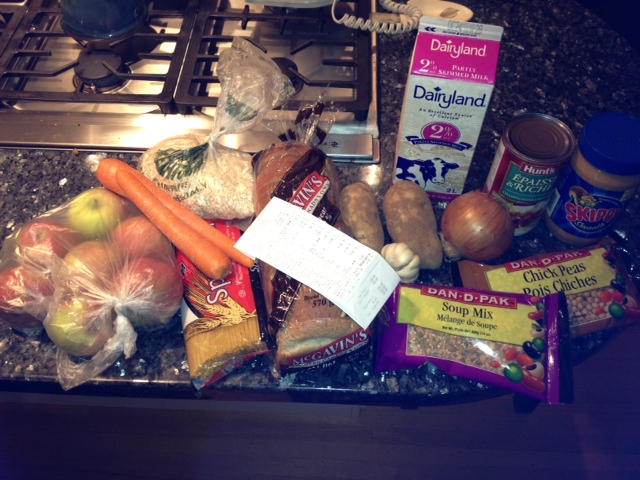Day 2, and I’ve already bent the rules. The battle against the cold is not going well, so I’m taking some cold medicine and drinking tea (which was not in my budget).
Otherwise, still on the plan. For dinner last night I had some of the large soup I made in preparation (it’s actually pretty good, if I do say so myself).
But overall, eating on this budget is a very plain affair.
Appreciate all the comments people have written in response to my Day 1 post — many more than I’m accustomed to. Clearly this challenge is capturing some interest, and sparking a dialogue about welfare rates (which is the point). Thanks to all who added your shopping advice. True, if I were buying for a month or for two people, I’d be able to buy more bulk items and stretch each dollar a bit further. And no doubt I would get somewhat smarter at the shopping if this was a longer-term reality (although I was very careful and zeroed in on the cheapest/sale options). But I doubt it would make a huge difference, either to the amount of food or to the narrow nutritional content.
The comments that stand out to me are from those who note how much harder this would be with kids, or without a car, or when the local food options are very limited, or when the monotony of this diet is an on-going reality of life, rather then merely a week-long challenge. It’s clear that when you are on a budget like this, the smallest additional need (for a personal hygiene item, or a child’s item, or medicine, etc.) can completely throw your budget into turmoil, leaving even less for food.
I especially appreciate the notes from those of you who really do live on social assistance, and for whom this is not a symbolic game. What your comments capture is the stress that inherently builds when this is a longer-term reality. When I was shopping on Monday, I made a point of asking a store clerk if they had any cheaper/old veggies in the back, only to have him look at me oddly and say they can’t sell that. And when I had to leave a lot of items at the check-out till, it felt a bit embarrassing. My income and privilege allows be to walk through life with a lot of confidence, so these momentary interactions roll off my back. But if these small humiliations were a regular feature of my daily life, there is no question they would be stressful.
Research tells us clearly that such stress is bad for one’s health, and we all pay for that (as Iglika Ivanova notes in her CCPA report on The Cost of Poverty in BC).
Had plain oatmeal again for breakfast. Will make that pasta for lunch and add chickpeas for some protein. I was to have a dinner meeting tonight, scheduled a while back, but as I can’t afford it, I had to re-arrange my plans. Meeting for tea instead and bringing a sandwich.



